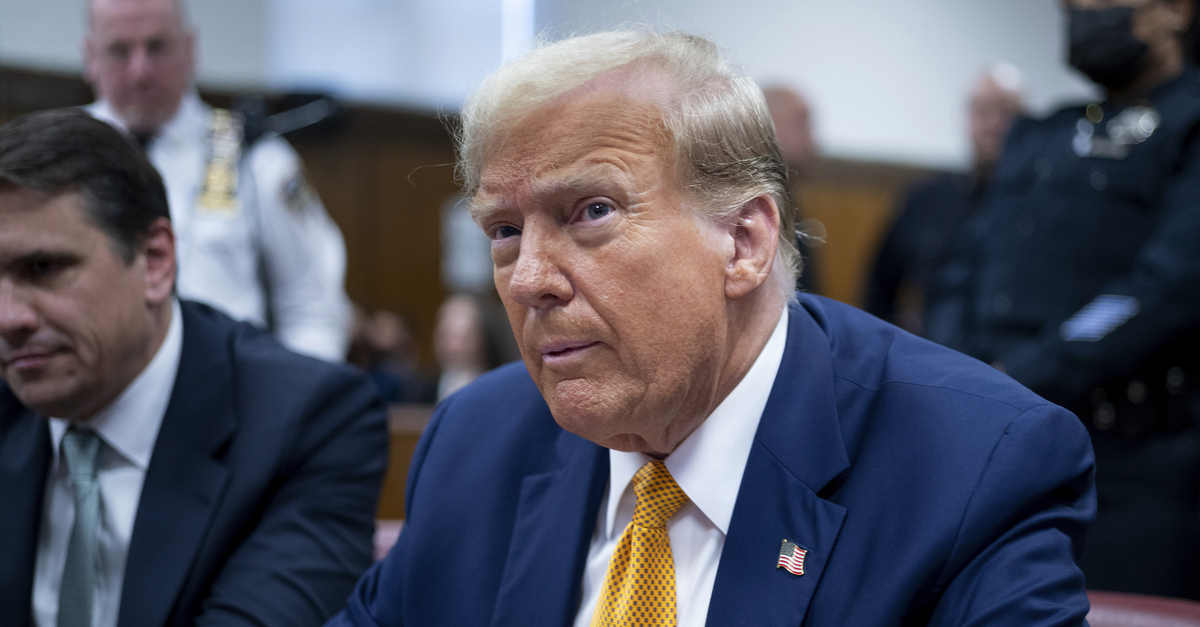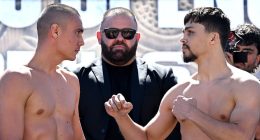
Former President Donald Trump waits for the start of proceedings in his trial at Manhattan criminal court, Tuesday, May 14, 2024, in New York. (AP Photo/Craig Ruttle, Pool)
A little-noticed evidentiary hearing in New York City’s hush-money prosecution of Donald Trump, 77, could have some big implications.
During Monday morning proceedings, away from jurors’ ears and minutes before the final day of the prosecution’s case-in-chief, New York County Supreme Court Justice Juan Merchan severely curbed what the defense could elicit from an expert witness regarding the Federal Election Campaign Act (FECA).
While the indictment itself does not reference the FECA, the press release announcing Trump’s indictment references “attempts to violate state and federal election laws.” Bragg’s team has gone on to argue the federal statute applies in subsequent court filings. And, in their opening statement, prosecutor Matthew Colangelo described the hush-money payment to Stormy Daniels, 45, as part of a criminal conspiracy “to corrupt the 2016 presidential election.”
The prosecution has offered the federal law as part of three potential areas of law — including state election law and federal and state tax laws — Trump attempted to break when he allegedly violated New York Penal Law Section 175.10. The falsifying business records law makes it a felony to commit “the crime of falsifying business records in the second degree” when an “intent to defraud includes an intent to commit another crime or to aid or conceal the commission thereof.”
Bragg’s office says the underlying crime is when Trump signed off on — personally signing in some cases — 34 different invoices, ledger entries and checks that align with the 34 §175.10 counts in the case. Those allegedly fraudulent documents all had to do with $420,000 worth of payments made to Michael Cohen, 57, throughout 2017.
The state’s theory says: attempted violations of other laws, including FECA, upgraded the second-degree, misdemeanor fraudulent business records offense into the first-degree felony version.
Maintaining this theory in jury instructions is primed to be an issue for various reasons — some obvious and some not.
The 45th president’s team aimed to call Capital University Law Professor Bradley Smith, a former Federal Election Commission commissioner and chair who was appointed by Bill Clinton, to the stand to discuss the intricacies of the complex federal campaign finance law as it relates to prosecution’s case.
But the court was skeptical Smith would hew to the bare minimum during his testimony. Merchan said he was inclined to allow the expert to explain, for example, the FEC’s role and basic campaign finance jargon like “expenditure,” according to a report by MSNBC’s Katie Phang.
The defense balked at that would-be use of time.
“We’re restricted in what Mr. Smith can say, and frankly, Mr. Smith reading the statutory definitions is not going to help the jury,” defense attorney Emil Bove said, nearly resigned, after Merchan issued the limitation on the potential testimony, according to a report by Just Security fellow Adam Klasfeld. “He’s a former commissioner of the FEC. So he has an authoritative view of what these things mean.”
In the end, due to the limits placed on the witness, the defense formalized their resignation and opted out of calling him entirely.
Smith took to X (formerly Twitter) to offer some thoughts on being left out of the case — outlining the role he believes he would have offered jurors and outlining what he would have said.
“Picture a jury in a product liability case trying to figure out if a complex machine was negligently designed, based only on a boilerplate recitation of the general definition of ‘negligence.’ They’d be lost without knowing technology and industry norms,” Smith tweeted. “Someone has to bring that knowledge to the jury. That — not the law — was my intended testimony.”
Beyond the basics of FECA, however, Smith also offered an explanation applied to the facts — which intended to benefit Trump.
“For example, part of the state’s case is that they wrongly reported what they knew to be a campaign expenditure in order to hide the payment until after the election,” the expert went on. “Cohen even testified they just wanted to get past the election. So, we were going to go over the reporting schedules, showing that even if they thought it was a campaign expenditure to be reported, an expenditure made on October 27 (when $$ sent to Daniels atty) would not, under law, be reported until Dec. 8, a full 30 days after election.”
Jurors, of course, never heard any of that. To the extent that is still part of the story the defense is inclined to tell, closing arguments will be the place to raise federal campaign finance arguments.
Merchan discussed the scope of FECA-related language during a jury charge conference late Tuesday afternoon, according to a report by Law&Crime Network reporter Terri Austin.
In order to complete the FECA conspiracy alleged by the government, a defendant must engage in a “willful” act, the defense argued — pushing to include “willful” in the FECA jury instruction. Oppositely, the state argued the conduct must simply be an “unlawful attempt” to commit an “object crime.” Merchan, by the end, appeared to lean in the defense’s direction by agreeing that a conspiracy requires intent.
Ultimately, the judge deferred ruling on the FECA upgrade issue — saying he would try to release finalized jury instructions by May 23.
Have a tip we should know? [email protected]



